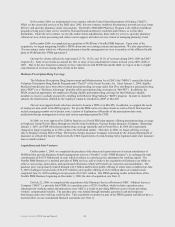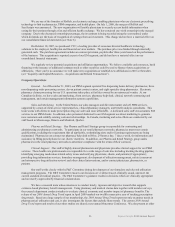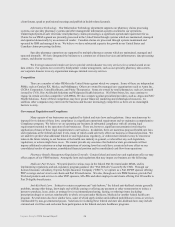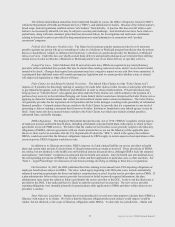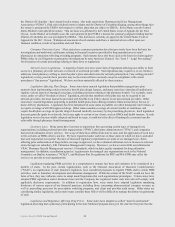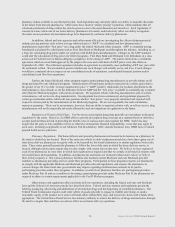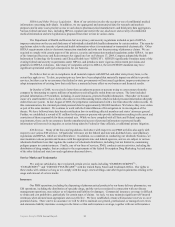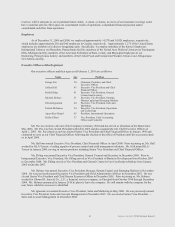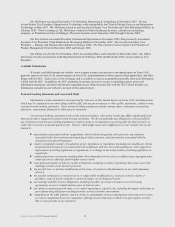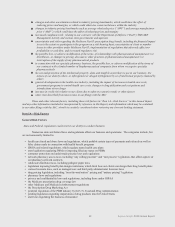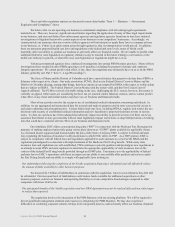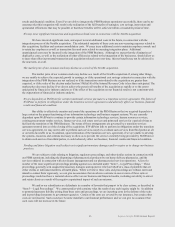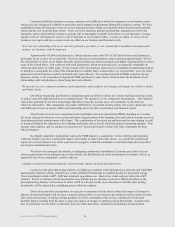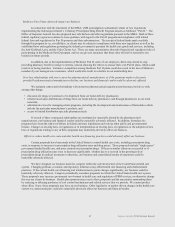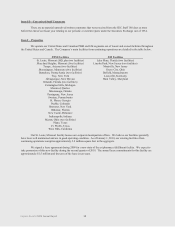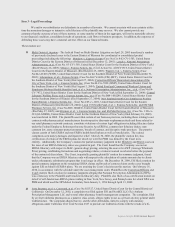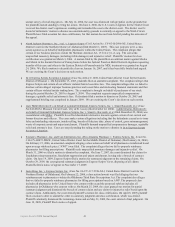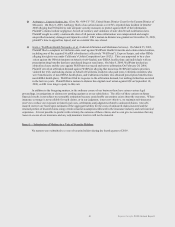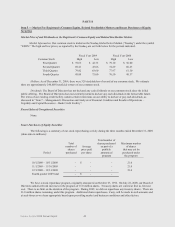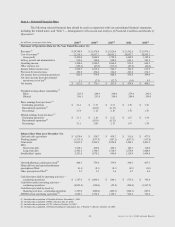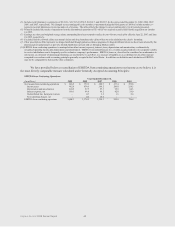Express Scripts 2009 Annual Report Download - page 36
Download and view the complete annual report
Please find page 36 of the 2009 Express Scripts annual report below. You can navigate through the pages in the report by either clicking on the pages listed below, or by using the keyword search tool below to find specific information within the annual report.
Express Scripts 2009 Annual Report 34
These and other regulatory matters are discussed in more detail under “Item 1 — Business — Government
Regulation and Compliance” above.
We believe that we are operating our business in substantial compliance with all existing legal requirements
material to us. There are, however, significant uncertainties regarding the application of many of these legal requirements
to our business, and state and federal law enforcement agencies and regulatory agencies from time to time have initiated
investigations or litigation that involve certain aspects of our business or our competitors’ businesses. Accordingly, we
cannot provide any assurance that one or more of these agencies will not interpret or apply these laws in a manner adverse
to our business, or, if there is an enforcement action brought against us, that our interpretation would prevail. In addition,
there are numerous proposed health care laws and regulations at the federal and state levels, many of which could
materially affect our ability to conduct our business or adversely affect our financial results. We are unable to predict what
additional federal or state legislation or regulatory initiatives may be enacted in the future relating to our business or the
health care industry in general, or what effect any such legislation or regulations might have on us.
Various governmental agencies have conducted investigations into certain PBM business practices. Many of these
investigations have resulted in other PBMs agreeing to civil penalties, including the payment of money and corporate
integrity agreements. We cannot predict what effect, if any, these investigations may ultimately have on us or on the PBM
industry generally (see Part I “Item 3—Legal Proceedings”).
The State of Maine and the District of Columbia each have enacted statutes that purport to declare that a PBM is a
fiduciary with respect to its clients. Our trade association, PCMA, filed suit in Federal District Courts in Maine and the
District of Columbia alleging, among other things, that these statutes are preempted by ERISA with respect to welfare plans
that are subject to ERISA. The Federal District Court in Maine ruled the statute valid, and the First Circuit Court of
Appeals affirmed. The PCMA received a favorable ruling in the case, challenging the D.C. statute; however, this matter is
currently on appeal. Other states are considering but have not yet enacted similar fiduciary statutes, and we cannot predict
what effect, if any, these and similar statutes may have on our business and financial results.
Most of our activities involve the receipt or use of confidential medical information concerning individuals. In
addition, we use aggregated and anonymized data for research and analysis purposes and in some cases provide access to
such data to pharmaceutical manufacturers. Various federal and state laws, including HIPAA, regulate and restrict the use,
disclosure and security of confidential medical information and new legislation is proposed from time to time in various
states. To date, no such laws have been adopted that adversely impact our ability to provide services, but there can be no
assurance that federal or state governments will not enact legislation, impose restrictions or adopt interpretations of existing
laws that could have a material adverse effect on our business and financial results.
Our subsidiary ESIC offers a prescription drug plan (“PDP”) in connection with the Medicare Part D program for
purposes of making employer/union-only group waiver plans (known as “EGWP” plans) available for applicable clients.
As a licensed insurer organized and licensed under the laws of the State of Arizona, ESIC is subject to federal and state
laws regulating the business of insurance in all jurisdictions in which ESIC offers its PDP. As a PDP sponsor, ESIC is
subject to compliance with all federal laws and regulations applicable to such sponsors as a result of the MMA and the
regulations promulgated in connection with implementation of the Medicare Part D drug benefit. While many state
insurance laws and regulations are well-established, CMS continues to provide guidance and promulgate new regulations in
an attempt to assist PDPs and state regulators to determine the appropriate applicability of state insurance laws in the
context of the federal Part D drug benefit provided through an EGWP plan. Uncertainty as to the applicability of federal
and state laws to ESIC’s operations could have an impact on our ability to successfully offer products and services under
the Part D drug benefit and our ability to comply with applicable laws in doing so.
Our indebtedness following the completion of the NextRx acquisition financing is substantial and will effectively reduce
the amount of funds available for other business purposes.
We incurred $2.5 billion of indebtedness in connection with the acquisition. Interest costs related to this debt will
be substantial. Our increased level of indebtedness could reduce funds available for additional acquisitions or other
business purposes, restrict our financial and operating flexibility or create competitive disadvantages compared to other
companies with lower debt levels.
The anticipated benefits of the NextRx acquisition and new PBM Agreement may not be realized fully and may take longer
to realize than expected.
The acquisition involves the integration of the PBM Business with our existing platform. We will be required to
devote significant management attention and resources to integrating the PBM Business. We may also experience
difficulties in combining corporate cultures. Delays in the integration process could adversely affect our business, financial


